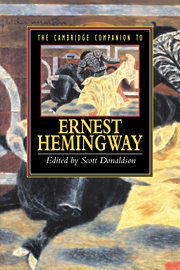Book contents
- Frontmatter
- 1 Introduction
- 2 Hemingway's journalism and the realist dilemma
- 3 1924
- 4 In Our Time, out of season
- 5 Brett and the other women in The Sun Also Rises
- 6 A Farewell to Arms
- 7 Hemingway's late fiction
- 8 Hemingway and politics
- 9 Hemingway and gender history
- 10 Hemingway, Hadley, and Paris
- 11 Hemingway's Spanish sensibility
- 12 The Cuban context of The Old Man and the Sea
- 13 Conclusion
- Selected Bibliography
- Index
- Series List
4 - In Our Time, out of season
Published online by Cambridge University Press: 28 May 2006
- Frontmatter
- 1 Introduction
- 2 Hemingway's journalism and the realist dilemma
- 3 1924
- 4 In Our Time, out of season
- 5 Brett and the other women in The Sun Also Rises
- 6 A Farewell to Arms
- 7 Hemingway's late fiction
- 8 Hemingway and politics
- 9 Hemingway and gender history
- 10 Hemingway, Hadley, and Paris
- 11 Hemingway's Spanish sensibility
- 12 The Cuban context of The Old Man and the Sea
- 13 Conclusion
- Selected Bibliography
- Index
- Series List
Summary
If there is one central story in the bundle of whipsaw-keen narratives, terse vignettes, and fragmentary epiphanies of Ernest Hemingway's In Our Time (1925), it may be “Out of Season.” The story probes the paradox of the book's title by asking, What does it mean to be in our time but out of season? The phrase “in our time” promises both relevance and revelation. It suggests that the book will deal with contemporary historical circumstances, perhaps record valuable collective wisdoms, and certainly stake a claim to documenting the entire epoch. Moreover, by echoing the plea in the English Book of Common Prayer to “Give us peace in our time, O Lord,” the phrase invites a new descent of the Holy Spirit into the era following the World War I apocalypse. But “Out of Season,” like all the stories of In Our Time, presents a world of thorough disorientation. Spiritual deadness, anomie, aimless wandering, conflict between genders and cultures, and miscommunication - these define the relationship between the expatriate American couple and their guide Peduzzi, and emerge more broadly as Hemingway's concerns in In Our Time, his first major inquiry into the state of the lost generation.
- Type
- Chapter
- Information
- The Cambridge Companion to Hemingway , pp. 55 - 86Publisher: Cambridge University PressPrint publication year: 1996
- 2
- Cited by

